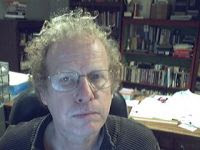Perkins Observatory does public programs most Friday nights. At the program September 4, 2009, one guest heard us sat that the Sun was about five billion years old and had about five billion more years to go. Then she asked "How do you know that?" This is one of those "onion" questions -- the answer has many layers and most of them can make you cry. Let's explore a few.
At the most fundamental layer, we don't know that. We don't know anything and our definition of science says we will never know anything. In the same sense, logic can tell you an argument is valid but will never prove it is true. Let's put that aside and ask the question less rigorously. What leads us t believe what we accept as true?
In a mystery novel, detectives compare the story of each witness to the others and to evidence on hand. If the collected information isn't consistent, then something is wrong somewhere. In a similar way, scientists compare ideas and observations looking for inconsistencies. If none are found over time, the ideas slowly gain acceptance. Contradictions force ideas to be reconsidered. Let's look at various ways we estimate the life cycle of the Sun as an example.
If we view the Sun as an engine which fuels itself by converting hydrogen to helium, we can estimate both age and life expectancy by comparing available and consumed fuel. If a car has 7 gallons left in a 12 gallon tank and the last gallon allowed the car to travel 30 miles, we can estimate that the car was fueled about 150 miles ago and has about 210 miles before it will need refueling. When we compare hydrogen o helium in the Sun, we get the numbers usually offered.
We get the model of how fast stars turn hydrogen into helium by collecting data about many different stars. We don' have the patience to spend hundreds of years watching a tree go from seed to scrap, but if we look at many trees in a forest we can find representative samples of various ages. From that, we can test our model and see how individual trees ft into it. You do the same sort of thing when you estimate a person's age by comparing observations about them to people whose age you think you know. Since the Sun can't be older than the universe itself, we can use the same method to define an upper age limit.
Finally, we can check what we believe about the Sun to other things we believe to see if the stories compare to one another. Since life on Earth depends on many things including sunlight, we look to see if the history of life on Earth is younger than the age we give to the Sun. This is equivalent to detectives comparing one story to another. No one story has all the facts, but the stories will either support or contradict each other. Cosmology, physics, chemistry, biology and other branches of science each tell a story about the universe around us. Science compares or interpretations of each story to related stories before we accept something as true.
|

No comments:
Post a Comment